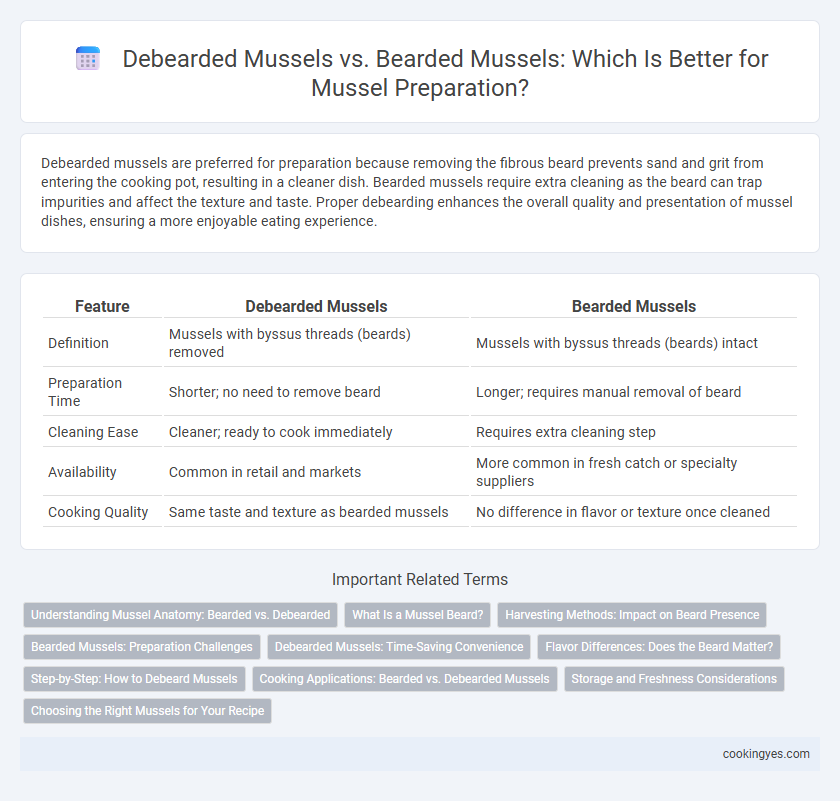Debearded mussels are preferred for preparation because removing the fibrous beard prevents sand and grit from entering the cooking pot, resulting in a cleaner dish. Bearded mussels require extra cleaning as the beard can trap impurities and affect the texture and taste. Proper debearding enhances the overall quality and presentation of mussel dishes, ensuring a more enjoyable eating experience.
Table of Comparison
| Feature | Debearded Mussels | Bearded Mussels |
|---|---|---|
| Definition | Mussels with byssus threads (beards) removed | Mussels with byssus threads (beards) intact |
| Preparation Time | Shorter; no need to remove beard | Longer; requires manual removal of beard |
| Cleaning Ease | Cleaner; ready to cook immediately | Requires extra cleaning step |
| Availability | Common in retail and markets | More common in fresh catch or specialty suppliers |
| Cooking Quality | Same taste and texture as bearded mussels | No difference in flavor or texture once cleaned |
Understanding Mussel Anatomy: Bearded vs. Debearded
Debearded mussels have had the fibrous byssal threads, or "beard," removed, which simplifies cooking and improves texture by preventing toughness. Bearded mussels retain these threads that mussels use to anchor themselves to surfaces, requiring extra effort during preparation to remove the beard for optimal edibility. Recognizing the difference between the beard's presence or absence aids in choosing mussels best suited for efficient cooking and enhanced flavor absorption.
What Is a Mussel Beard?
A mussel beard, known as the byssus, consists of fibrous threads that mussels use to attach themselves to surfaces. Debearded mussels have had these byssus threads removed to ensure a cleaner preparation and prevent an unpleasant chewy texture. Cooking mussels without the beard improves tenderness and prevents debris from affecting the flavor and presentation of dishes.
Harvesting Methods: Impact on Beard Presence
Debearded mussels undergo a manual or mechanical process to remove the beard, which consists of byssal threads used for attachment, enhancing their market appeal and ease of cooking. Bearded mussels retain these threads as they are harvested directly from natural or aquaculture sources without prior cleaning. Harvesting methods involving careful detachment from substrates reduce beard presence, impacting subsequent preparation steps and overall texture.
Bearded Mussels: Preparation Challenges
Bearded mussels require meticulous removal of the tough, fibrous byssal threads, commonly known as "beards," which can be time-consuming and labor-intensive compared to debearded mussels. Failure to properly clean these threads can result in a gritty texture and an unpleasant eating experience. The preparation of bearded mussels also demands careful inspection to avoid damaged shells and ensure freshness for optimal flavor and safety.
Debearded Mussels: Time-Saving Convenience
Debearded mussels offer significant time-saving convenience during preparation as their beards--the fibrous threads used for attachment--are already removed, eliminating the need for manual cleaning. This ready-to-use feature reduces prep time by up to 30%, making them ideal for chefs and home cooks seeking efficiency without compromising freshness or quality. In contrast, bearded mussels require additional cleaning, which can be labor-intensive and slower, especially when preparing large quantities.
Flavor Differences: Does the Beard Matter?
Debearded mussels offer a cleaner texture and milder flavor, as removing the beard reduces bitterness typically associated with the byssal threads. Bearded mussels retain more marine minerals and natural brininess, enhancing their robust, oceanic taste. Choosing between them depends on desired flavor intensity and preparation method, with debearding favored for subtle dishes and bearded mussels preferred for bold, hearty recipes.
Step-by-Step: How to Debeard Mussels
Debearded mussels require removing the fibrous beard, or byssal threads, before cooking to ensure a cleaner taste and better texture. To debeard mussels, firmly grasp the beard near its base and pull it towards the hinge of the shell, away from the muscle, to avoid damaging the mussel. Bearded mussels, left without debearding, can retain grit and have a chewier texture, making the cleaning step crucial for optimal preparation.
Cooking Applications: Bearded vs. Debearded Mussels
Debearded mussels are preferred for steaming, grilling, and baking as removing the beard improves presentation and prevents unwanted toughness, while bearded mussels can impart a slightly brinier flavor but require extra cleaning to avoid gritty textures. Cooking applications demanding a cleaner appearance, such as mussel salads or elegant seafood platters, benefit from debearded mussels, whereas rustic dishes like mussel chowders tolerate bearded mussels due to their robust flavor profile. Efficient preparation involves debearding mussels by pulling out the byssal threads to enhance texture and taste, optimizing culinary results for diverse recipes.
Storage and Freshness Considerations
Debearded mussels display longer shelf life and maintain freshness better during storage, as the removal of the beard reduces microbe accumulation and water retention. Bearded mussels, while fresher immediately after harvest, tend to spoil faster and require quicker consumption or more careful storage in cold, moist environments. Properly debearded mussels stored between 1-4degC can remain fresh up to 5 days, whereas bearded mussels typically last only 2-3 days under similar conditions.
Choosing the Right Mussels for Your Recipe
Debearded mussels are preferred for cooking because removing the beard, the fibrous threads attached to the shell, ensures a cleaner presentation and prevents an unpleasant texture in dishes. Bearded mussels require extra preparation time as the beard must be manually removed before cooking to avoid toughness and improve flavor absorption. Selecting debearded mussels simplifies the cooking process and enhances the overall quality of seafood recipes.
Debearded mussels vs Bearded mussels for preparation Infographic

 cookingyes.com
cookingyes.com